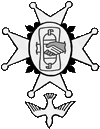AS MIGHT BE IMAGINED, we receive many enquiries from those researching Walloon and Huguenot ancestry.
Contrary to popular belief there is no single "Huguenot Register", although this legend tends to be supported by a list of just 459 family names with the grandiose title "Roll of the Huguenots" produced circa 1885. A copy of this oddity used to be displayed on our chapel door and it is still mentioned on some internet websites.
Serious researchers ignore it.
Walloon and Huguenot family names are of course legion. Surely every Walloon or French family name has at some time had Protestant adherents and thousands of French-speaking Protestants fled here from their own homelands. Happily, Protestant refugees to England in the 16th and 17th centuries kept excellent records of births, marriages, deaths and other matters and interested researchers are advised to contact all of the following.
This church no longer holds its ancient records. The original registers of the Walloon and Huguenot chapels in Canterbury are in The National Archives, Kew, Richmond, Surrey, TW9 4DU telephone 020 8876 3444 or email via the links on the National Archives website, www.nationalarchives.gov.uk. Most of our other records have been deposited for safe-keeping in Canterbury Cathedral Archives. They are available for inspection in the search room of Canterbury Cathedral Archives and Library together with printed editions of our registers.
Also held in the Cathedral Archives are registers for the neighbouring Church of England parishes as well as some nonconformist ones (there were times when The Strangers had their children baptised in Canterbury parish churches). The official address of Canterbury Cathedral Archives is: Canterbury Cathedral Archives, The Precincts, Canterbury, Kent CT1 2EH; telephone 01227 865330; fax 01227 865222; email archives@canterbury-cathedral.org.
The staff at Canterbury Cathedral Archives are able to do a limited amount of research on readers’ behalf (chargeable to the reader), but usually cannot undertake substantial research inquiries. A list of private researchers is held at the Archives and normally issued to enquirers wanting to have research done. For those who come in person to do their own research, however, the service is free.
The demand for access to the Cathedral Archives is such that an appointment needs usually to be made about a week ahead. Access to Canterbury Cathedral Archives is by CARN (County Archive Research Network) ticket. Arrangements for obtaining a CARN ticket will be explained when the appointment is made. NB users of the Archives and Library are exempt from the normal charge for admission to the Precincts. Further information about Canterbury Cathedral Archives and Library is available on the Canterbury Cathedral website, at www.canterbury-cathedral.org.
Those with only a few hours to spend in Canterbury might visit the Local Studies Centre at the Royal Library (usually known as the Beaney Institute) in the High Street.
The reference section contains a number of the principal works on the subject available for immediate access, including the printed registers and other editions of the works of The Huguenot Society. When I last checked, the Local Studies Centre opening hours were Monday and Tuesday, 2-5pm, Thursday and Friday 9.3Oam-lpm and 2-5pm, Saturday 9am-lpm and 2-5pm (tel. 01 227 463 608)
The standard historical work on the French Church at Canterbury is The History of the Walloon and Huguenot Church produced by Francis W Cross in 1898 when Mr Cross was a leading member of the congregation.
For guidance as to how to conduct personal research on this subject I recommend A Family from Flanders published by Collins in 1985 ISBN 0-00-217346-8 written by my second cousin the late John Peters CB.
The Huguenot Society of Great Britain and Ireland, University College, Gower Street, London WC1E 6ET issues many publications for sale, copies of which can be examined at many local libraries.
The society library contains many rare volumes, documents, manuscripts and other items including Walloon and Huguenot pedigrees and other genealogical material, reserved for reference only. There is much information about the French Church at Canterbury and about La Providence the French Hospital, formerly at Hackney and, since 1958, at Rochester.
Those interested in joining the society should apply to the administrative secretary with a stamped addressed envelope. Members of the society (known as Fellows) have free access to the library. Non-members have to pay. When I last checked the fees, they were £10 per day per person. Opening hours are I believe 10 to 4 Tuesday and Wednesday. You must make an appointment. Email library@huguenotsociety.org.uk.If you write with a stamped addressed envelope, the librarian will provide basic information and offer general guidance on research.
Detailed research enquiries should be addressed to the research officer, Mr Michael J Gandy BA FSG c/o the library or e-mail mgandy@clara.co.uk. He will quote fees in advance. All communication with the society must be by letter or e-mail. The Society web-site is www.ucl.ac.uk/ucl-info/divisions/library/huguenot.htm
Those with Flemish, Dutch and Walloon ancestry, might also try Mrs Jean Tsushima of the Low Countries Research Group at Malmaison, Church Street, Great Bedwyn, SN8 3PE
There is a considerable amount of general genealogical material in the records of the Society of Genealogists, 14 Charterhouse Buildings, off Goswell Road, London EC1M 7BA Send 9in x 4in stamped addressed envelope or telephone 020 7250 0291or email library@sog.org.uk
Registration details for England and Wales since 1837 are now housed at the Family Records Centre, 1 Myddelton Street, London EC1R 1UW telephone 020 8392 5300.
Other sources of genealogical information will of course emerge as individual researches progress.
One final thought: those whose ancestry in this country goes back several generations are likely to have Walloon or Huguenot ancestry. If you count back through the generations, doubling-up each time, two parents, four grandparents, eight great-grandparents and so on, you will see that, between 300 and 400 years ago, each of us had 2,000 to 8,000 ancestors and, at that time, England gave sanctuary to many thousands of refugees – a surprisingly high proportion of the population at the time.
Michael H Peters
June 2008
